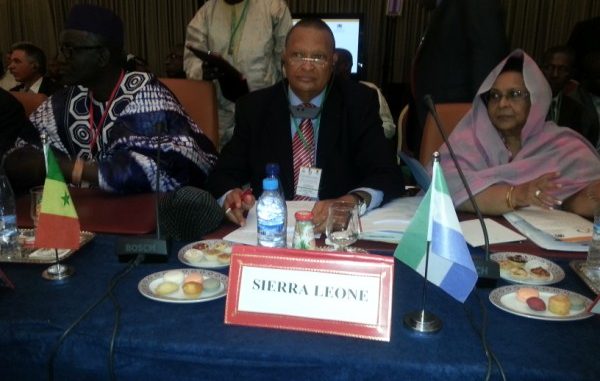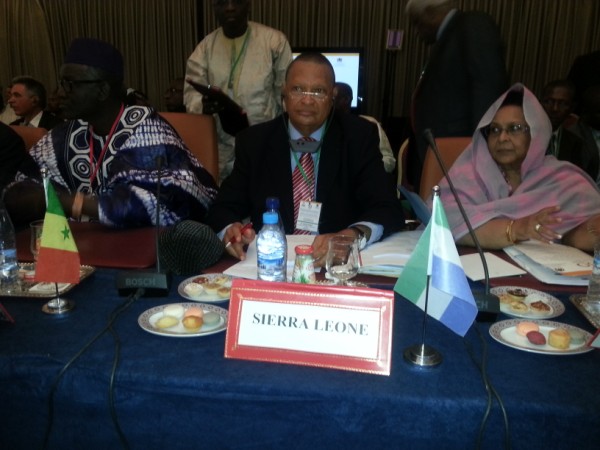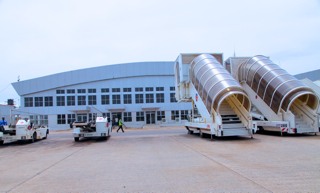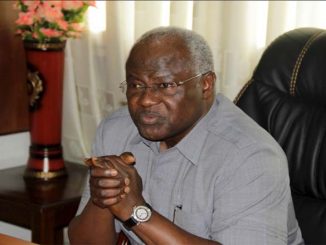
By Amadu Femoh Sesay —Information Officer-Cabinet Secretariat :
The Secretary to the Cabinet and Head of the Civil Service, Dr. Ernest Sahid Alie Surrur attended a three day interregional conference from 12th-14th May organized by the African Training and Research Centre in Administration for Development (CAFRAD) in the Kingdom of Morocco. The conference which was attended by 250 participants was organized for decision and policy makers in public/administration and governance especially Ministers in charge of Public/Civil Service, Heads of Public Sector in Africa, Latin America and Arab countries. 
Surrur flanked by two other participants at the Conference
The Secretary to the Cabinet said the theme for this year’s conference was ‘Developing Strategic Vision and Leadership for Public Sector Innovation and Modernization in Light with National Economic and Social Development Vision’.
Dr. Surrur disclosed that the main objective of the conference was to expose leaders and managers of Public Sector/Administration to current trends and developments in reforming, innovating and modernizing public administration and state institutions. In outlining the new role of the CAFRAD for the next 50 years, the Head of the Civil Service suggested that in its training programmes, more emphasis should be on changing the mindsets to foster; open government and open administration to assist the efforts of countries in public sector transparency, efficiency, professionalism, integrity accountability and the fight against corruption; support the effort of transformation, emergence and socio-economic development of Africa nations; assist countries to promote research to better grasp and face up the challenges of the Public Sector modernization and of the emergence of countries in Africa and e-Governance/e-Administration to promote popular participation of the populace in governance and to bring government close to the people.
The Permanent Secretary, Nigeria Federal Ministry of Communication Technology, Dr. Tunji Olaopa observed that modernizing the Civil Service requires a deep level of rethinking the whole concept of the Civil Service at the philosophical and institutional levels in a manner that will accord with both the democratic and technological demands of the global society. Dr. Olaopa said the Civil Service has come a long way and still has a very long way to go with several hurdles to cross. He stated that one of the hurdles is the urgent need to transcend its own internal dynamics that has constituted a self-imposed restriction on its progress. The Permanent Secretary said bureaucracy has over the years become an albatross for administrative evolution. Dr. Olaopa noted that the administrative progress must therefore involve a process of self-transcendence that requires a significant rethinking of the Civil Service’s past as a way of rejuvenating it future prospect.
CAFRAD was established on 13th May 1964. It began with the 12th Session of the General Conference of UNESCO held in 1962 when Morocco led nine other African states in presenting a Draft Resolution requesting UNESCO to assist in the creation of a regional centre, as an instrument of inter-African cooperation in the development of public administration on the continent. The main of objectives of CAFRAD are as follows; Capacity development; Develop and mobilize African expertise to provide expert advice to countries involved in reorganization, innovation, modernization, and re-inventing public administration and governance; Develop partnership and collaboration with national, regional and international organizations in the area of training, research, and consultancy in public administration and governance; Act as host and scientific liaison for the particular benefit of institutes and schools of administration and governance, universities and more generally, any other agencies, whose activities come within the scope of the Centre’s competence and Promote inter-African cooperation and serve as a think-tank framework for knowledge development and exchange of experiences between experts, practitioners and policy-makers and institutions.




Leave a Reply